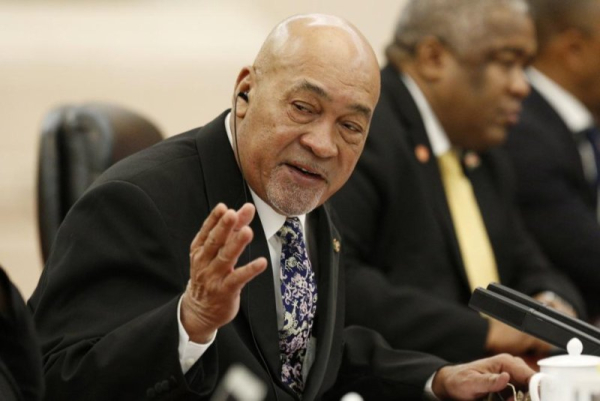
Former Suriname President Desi Bouterse attends a meeting with Chinese Premier Li in Beijing on Nov. 27, 2019, and two days later was sentenced to 20 years in prison for his role in the politically motivated December Murders of 1982. File Photo by Florence Lo/EPA-EFE/Pool
Desi Bouterse, a former dictator and later president of Suriname who was convicted of murder and drug trafficking, died on Tuesday at age 79.
Suriname Vice President Ronnie Brunswijk formerly was Bouterse’s bodyguard before becoming one of his political opponents and announced the death of the former dictator and president in a post on Facebook, the New York Times reported. Advertisement
Bouterse died on Tuesday, Brunswijk said, and local media reported he had been afflicted with an unknown sickness.
The former dictator and president had been in hiding after vanishing a year ago after a court sentenced him to 20 years in prison for the 1982 murders of 15 political adversaries.
Bouterse was a former military leader in Suriname who led a coup to take power and become Suriname’s dictator in 1980.
Bouterse also was elected president of Surname about 30 years after the coup, but he eventually was convicted of killing political opponents and drug trafficking. Advertisement
While dictator, Bouterse on Dec. 8, 1982, ordered the arrest, torture and murder of 15 dissidents, who he feared might lead a counter-coup against his regime. Among those killed were professors, journalists and attorneys.
The murders are remembered as the “December Murders” and caused the Netherlands to cease all support of Suriname.
Bouterse was born on Oct. 13, 1945, quit high school and joined the Dutch Army. He stayed in the military after Suriname gained its independence in 1975, which enabled him to lead the military coup five years later.
Bouterse was a graduate of the Royal Military School in the Netherlands and served in the Dutch army in the Netherlands and Germany before returning to Suriname just before gaining its independence from the Netherlands on Nov. 25, 1975.
He joined the new nation’s newly created military and led the coup nearly five years later after Prime Minister Henck Arron banned the military from forming a union.
Bouterse led 15 other soldiers in overthrowing Arron and the Surinam government on Feb. 25, 1980.
Bouterse promised to reform the government but didn’t, which led to growing political opposition that culminated in the 15 politically motivated murders for which Bouterse eventually was convicted. Advertisement
Brunswijk in 1986 led a civil war against Bouterse that lasted for six years in Suriname’s jungles. The war led to human rights violations by both sides and the deaths of hundreds.
The civil war eroded support for Bouterse’s regime, and he accepted free elections in November 1987 after Bouterse formed the National Democratic Party.
Bouterse lost the election to President Ramsewek Shankar but remained in control of the nation’s military.
The military in 1990 took control of the government and unseated Shankar as president, but civilian rule returned a year later.
Bouterse left the military in 1993 and became a full-time politician and businessman. He later won election as president in 2010.
A military court initiated a trial against Bouterse and 24 co-defendants in 2007 for the December Murders of 1982, but the trial lasted more than a decade.
The military trial eventually resulted in the 20-year sentence for the 1982 murders, but Bouterse did not serve any time in prison because he left the nation.
While president, Bouterse enacted several social reforms that were inspired by Venezuelan President Hugo Chavez that were popular but eventually decimated the national economy.
He also made several trips to Cuba, including a month-long trip in 2017 to undergo surgery for an unknown medical condition. Advertisement
Despite his success in Surname, the Netherlands in 1999 sentenced Bouterse to 11 years in prison for smuggling cocaine into the Netherlands.
A lack of an extradition treaty between Suriname and the Netherlands enabled Bouterse to avoid being sent to a Dutch prison.
Bouterse was celebrated as a populist president by his supporters and reviled as a brutal and murderous dictator who engaged in drug trafficking by his detractors.
He was married two times and had three children, one of whom, Dino Bouterse, is serving a 16-year prison sentence for drug trafficking in the United States.
The Republic of Suriname is located north of Brazil and between Guyana and French Guiana along South America’s northeastern Atlantic Coast region.
Suriname had a population of 623,236 in 2023, according to World Bank.